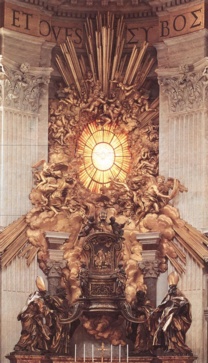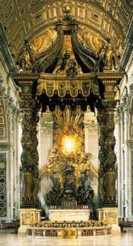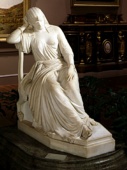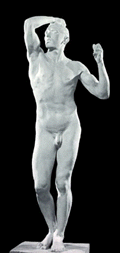
Attributed to Jacopo Della Quercia (Italian, Siena, 1371/74-1438), Virgin and Child, c. 1430-1435(?), polychromed wood statue, height 1.78 m, Louvre. See Madonna and Middle Ages.
Donatello (Italian, 1386-1466). See a Donatello site [text in Italian].

Andrea Della Robbia (Italian, Florence, 1435-1525), Virgin, from The Annunciation,
c. 1475-80, lead-glazed
terra cotta, height
56 inches (165.1 cm), (other figures — Archangel Gabriel God the Father, Dove of the Holy Spirit — not
illustrated). Los Angeles County Museum of Art.

Andrea del Verrocchio (Italian, 1435-1488), Bust of a Young Woman, marble, height 18 7/8 inches (48 cm), width 19 3/16 inches (48.7 cm), diameter 9 3/8 inches (23.8 cm), Frick Collection, NY. See Renaissance.
Gregor Erhart (German, -1540), Saint Mary-Magdeline, Augsburg, early sixteenth century, polychromed limewood, 69 1/2 x 17 1/2 x 17 inches (177 x 44 x 43 cm), Louvre. See Northern Renaissance and wood.
Michelangelo (born Michelangiolo Buonarroti) (Italian, 1475-1564), The Rome Pietà [detail of the faces of Christ and the Madonna], 1498-1500, marble, entire height 68 1/2 inches, maximum width of base 76 3/4 inches, maximum depth 27 1/8 inches, St. Peter's Basilica, Vatican, Rome. Carved in Rome for the French king Charles VIII's ambassador to Pope Alexander VI. See Madonna and Pietà.

Michelangelo
 , David
, 1501-04, marble, height
of statue 17 feet, base
6 feet x 1 foot 5 1/4 inches x 1 foot 2 7/8 inches, Galleria
dell'Accademia, Florence. [
, David
, 1501-04, marble, height
of statue 17 feet, base
6 feet x 1 foot 5 1/4 inches x 1 foot 2 7/8 inches, Galleria
dell'Accademia, Florence. [detail:
the head] Michelangelo began work on the colossal
figure of David
in 1501, and by 1504 the sculpture was in place outside the Palazzo
Vecchio. The choice of David was supposed to reflect the power
and determination of Republican Florence and was under constant
attack from supporters of the usurped Medicis. In the nineteenth
century the statue was moved to the Accademia. For numerous pictures
of sculptures by Michelangelo, visit 1200
years of Italian Sculpture.
Stanford Computer Graphics Laboratory, Los Angeles, CA, has recently produced ultra-high-resolution digital images of Michelangelo's David and St. Matthew sculptures.

Michelangelo, Moses,
1508-16 and 1542-45, marble, height 7 feet 8 1/2 inches,
width of base
at front 3 feet 1 1/2 inches, depth
of base 3 feet 3 3/4 inches,
San Pietro in Vincoli, Rome. This sculpture is at the base
of Pope Julius II's mausoleum. [Detail of the head
of Moses. Moses's horns derive from a long tradition in
which horns were symbolic of divinity
in Near Eastern and Nordic cultures.]
Michelangelo, The Dying Slave, Rome, 1513-1515, unfinished statue in marble, height 7 feet 6 1/8 inches (2.09 m), Louvre.
Michelangelo, The Rebellious Slave, Rome, 1513-1515, unfinished statue in marble, height 7 feet 5/8 inches (2.09 m), Louvre.

Michelangelo, Tomb
of Giuliano de'Medici, 1526-1534, marble,
San Lorenzo, Cappella Medicea, Florence. In the niche is the
statue of Giuliano Duke of Nemours who died in 1561. Below this,
reclining on Giuliano's sarcophagus,
are allegorical sculptures of
Night (Notte) and Day (Giorno).
Night (La Notte) [detail], marble, length of the entire figure 76 3/8 inches, depth 24 3/4 inches.
Day (Il Giorno), marble, length 72 3/4 inches (185 cm), depth 34 1/4 inches.

Michelangelo, Tomb
of Lorenzo de'Medici, marble,
San Lorenzo, Cappella Medicea, Florence. This includes a statue
of Lorenzo, Duke of Urbino, who died in 1519, and of the allegorical figures of Twilight and Aurora.
Lorenzo is 70 1/8 inches in height,
26 3/4 inches wide, 28 3/4 inches deep.
Twilight (Il Crepuscolo) [detail], marble, the entire figure 76 3/4 inches long, 31 1/2 inches deep.
Dawn (L'Aurora), c. 1515, marble, length 81 inches, depth 24 3/8 inches. [details of the head of Twilight: one and another.]

Michelangelo Buonarroti, Crouching Boy, c.1530-1534, marble,
height 54 cm, Hermitage
Museum, St. Petersburg, Russia.
Giambologna, known in France as Jean Boulogne or Jean de Boulogne (Italian, 1529-1608), Flying Mercury, bronze, 1.7 x 0.57 x 1.4 m, Louvre. See mythology.

Annibale Fontana (Italian, Milan, 1540[?]-87), Adoring Angel, 1583-84, wax with metal armature on wood base, height (with base) 21 3/4 inches (55.2 cm), Los Angeles County Museum of Art.
Adrien de Vries (Flemish, c. 1546-1626), Mercury and Psyche,1593, bronze, 84 1/2 x 36 x 28 inches (215 x 92 x 72 cm), Louvre. See Baroque.
Italy, Naples, c 1600, Archangel Raphael, polychromed and gilded wood, height 70 inches (177.8 cm), Los Angeles County Museum of Art.


Gianlorenzo Bernini (Italian, 1598-1680),
Dove
of the Holy Spirit, c. 1660. This stained glass window is the highly dramatic
focal point of
The Throne of Saint Peter, 1657-66, marble, white
and gilt stucco,
surrounding the stained glass; its overall height
about 100 feet, Saint Peter's Basilica, Vatican, Rome.
The Throne is a huge  Baroque
sculptural composition
behind the altar, in the
apse of the basilica.
Baroque
sculptural composition
behind the altar, in the
apse of the basilica.
The Throne of Saint Peter, with its important stained glass window, is first
seen when approaching it in the frame formed by Bernini's Baldacchino,
1624-33. See baldacchino.
Pierre Puget (French, 1620-1694), Milo of Crotona Devoured by a Lion,1670-1682, marble,106 x 55 x 35 inches (270 x 140 x 98 cm), Louvre.
Jean-Baptiste Pigalle (French, 1714-1785), Mercury Fastening His Winged Sandals,1744, marble, 23 x 14 x 12 inches (59 x 34 x 30 cm), Louvre. See Rococo.

Jean-Antoine Houdon (French, 1741-1828), Diana the Huntress, probably between 1776 and 1795, terra cotta, height overall 75 1/2 inches (191.8 cm), height of figure 68 1/8 inches (173 cm), Frick Collection, NY. Inscribed on the top of the base in the front left corner: "HOUDON Scult." See Neoclassicism.

Antonio Canova (French, 1757-1822), Cupid and Psyche, 1796, marble,
height 137 cm, Hermitage
Museum, St. Petersburg, Russia. This is the second version of
two; the first being in the collection of the Louvre.
John Deare (English, 1759-98, active in Italy), Judgment of Jupiter, 1786-87, marble relief, 58 1/4 x 117 1/4 inches (148 x 297.8 cm), Los Angeles County Museum of Art.
Antoine Louis Barye (French, 1796-1875), Lion Fighting a Serpent,1832-1835, bronze, 53 x 70 x 38 inches (135 x 178 x 96 cm), Louvre. See animalia and Romanticism.
Hiram Powers (American, 1805-1873)

Jean-Jacques Feuchère (French, 1807-1852), Satan, c. 1836, bronze,
height 31 inches (78.7 cm),
Los Angeles County Museum of Art.

William Wetmore Story (American, 1819-95,
active in Italy), Cleopatra, 1858, white marble,
height 55 inches (139.7
cm), Los Angeles County Museum of Art.

John Quincy Adams Ward (American, 1830-1910),
The Freedman, 1863, bronze,
19 5/8 x 14 5/8 x 7 1/8 inches (49.8 x 37.1 x 18.1 cm), Cincinnati
Art Museum, OH.
Edgar Degas (French, 1834-1917)

Auguste Rodin (French, 1840-1917), The Age of Bronze, 1877, plaster,
height 173 cm, Hermitage
Museum, St. Petersburg, Russia.
Auguste Rodin, She Who Was the Helmet-Maker's Beautiful Wife, c. 1880-85, bronze, height 19 1/2 inches (49.5 cm), Los Angeles County Museum of Art.

Auguste Rodin, Monument to Balzac, 1897-98, bronze
(cast 1954), 9 feet 3
inches x 48 1/4 inches x 41 inches (282 x 122.5 x 104.2 cm),
Museum of Modern Art, NY. See monument.


Auguste Rodin, The Kiss [detail], 1901-4, Pentelican marble, 182.2 x 121.9 x 153.0 cm, weight 3180 kg, Tate Gallery,
London.
Pierre-Auguste Renoir (French, 1841-1919), Bust of Madame Renoir, 1916, polychromed cement, Musée d'Orsay, Paris. See bust.
Augustus Saint-Gaudens (American, 1848-1907), Amor Caritas, 1880-98, this cast 1918, gilded-bronze relief, Metropolitan Museum of Art, NY.

Augustus Saint-Gaudens, Robert Gould
Shaw and the 54th Regiment Memorial, Boston, 1897-1900, bronze relief.
Until recently, the original
(patinated) plaster was housed in the sculptor's home at
Cornish, New Hampshire. Newly refurbished, it is now exhibited
at the National Gallery, Washington, DC. The subject of this
sculpture is also that of the movie Glory
[link to a still from the movie] (Edward Zwick, 1989). See patina.
Examples by artists born earlier or later than those represented
above:
Also see assemblage, bas-relief, carved, cast, in the round, mold, and relief, as well as articles about various cultures, styles, movements, media, etc.
https://inform.quest/_art